In my last blog post, I talked about the importance of reskilling and upskilling. I also talked about the three big areas that future employers will be looking for in this new emerging economy. The three big skills are Innovation, Creativity, Collaboration.
This final post in my three part series is about how Master’s is preparing your child for the Fourth Industrial Revolution. In fact, since our inception in 1997, Master’s has been creating a pedagogy specifically for the future we are entering right now.
But I’ll get to that later…
First, let’s look at some more goodies from the World Economic Forum. You won’t believe it. They’ve actually done a report on the future of education. Here’s the title below…
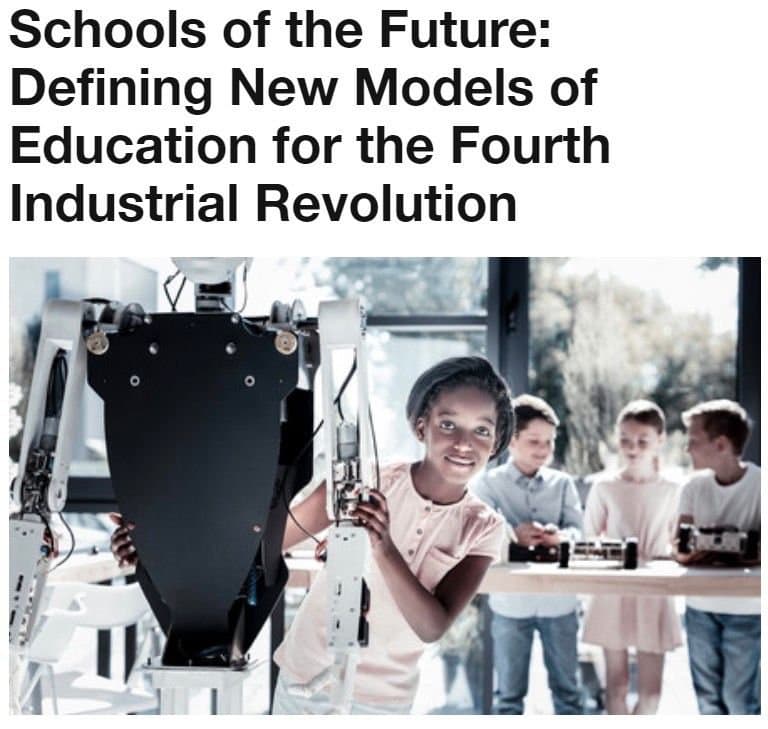
How the World Economic Forum Sees Education Changing
Just let that title sink in for a moment…
While you do, let me remind you that the WEF is made up of highly influential government and corporate individuals.
It’s indeed a hodgepodge of powerful people. At the Annual Meeting in Davos, Switzerland the Finance Minister of a European country could be sitting down in a session on global education with Bill Gates on one side of her and Bono on the other.
The best way to see the future is to create it. So when you see a white paper on education written by the WEF, it’s important to pay attention.
The School of the Future report is a direct and immediate response to the Fourth Industrial Revolution white paper.
Read this quote here from the report to get a sense of what is in store for education over the next ten years…
“Transitioning all education systems to ones designed for the Fourth Industrial Revolution—Education 4.0—has tremendous potential to better prepare children for the future of work, revive pathways to social mobility, improve productivity and enhance social cohesion.”
The basic argument of the report is that the current education system was created for the first, second, and third industrial revolutions and is therefore obsolete.
The Core Skills That Will Be Relevant for the Future
Now that we are entering the Fourth Industrial Revolution, what used to be considered core skills are becoming less relevant.
What the pundits of this model are advocating is that education needs to focus on innovation, creativity, collaboration. Correspondingly, these are the very skills needed for the future of work in the Fourth Industrial Revolution.
Nevertheless, while creativity and innovation are being highlighted pedagogically, at Master’s we believe that students must also excel in what would be traditional subjects such as reading, writing, and arithmetic—though if you look at the white papers these subjects are considered to be losing relevance. As educators and parents we need to be critical of this kind of futurist picture—but that’s for another post.
Here are the top 8 skills, according to the World Economic Forum report …
Top 8 Skills Your Child Needs for the Future of Work
- Global citizenship skills: Awareness about the wider world, sustainability, and global community
- Innovation and creativity skills: Complex problem-solving, analytical thinking, creativity, and systems analysis
- Technology skills: Programming, digital responsibility and the use of technology
- Interpersonal skills: Emotional intelligence, including empathy, cooperation, negotiation, leadership and social awareness
- Personalized and self-paced learning: Focus on diverse individual needs of each learner, with flexibility that enables each learner to progress at their own pace
- Accessible and inclusive learning: Everyone has access to learning and is therefore inclusive. Learning not just for specific people who control means of access.
- Problem-based and collaborative learning: Project- and problem-based content delivery requiring peer collaboration and more closely mirroring the future of work
- Lifelong and student-driven learning: A system where everyone continuously improves on existing skills and acquires new ones based on their individual needs
While this approach may be new to many schools, it is not new to Master’s.
Since 1997 Master’s has been researching and developing Profound Learning, which is a system of pedagogy that prepares students for the future.
There are myriads and myriads of programs and projects we’ve worked on in Master’s R&D that I could list here. But I’ll simplify things by breaking down our model for you.
Profound Learning: The Big Cake
At Master’s we often describe our learning model as likened to a four-layer cake.
The bottom two layers of the cake deal with giving children the tools to become life-long learners. Ownership happens through a shift in teacher and student roles where students learn to take responsibility for their learning. And Mastery is the process of students tracking, identifying and closing their learning gaps to ensure excellence.
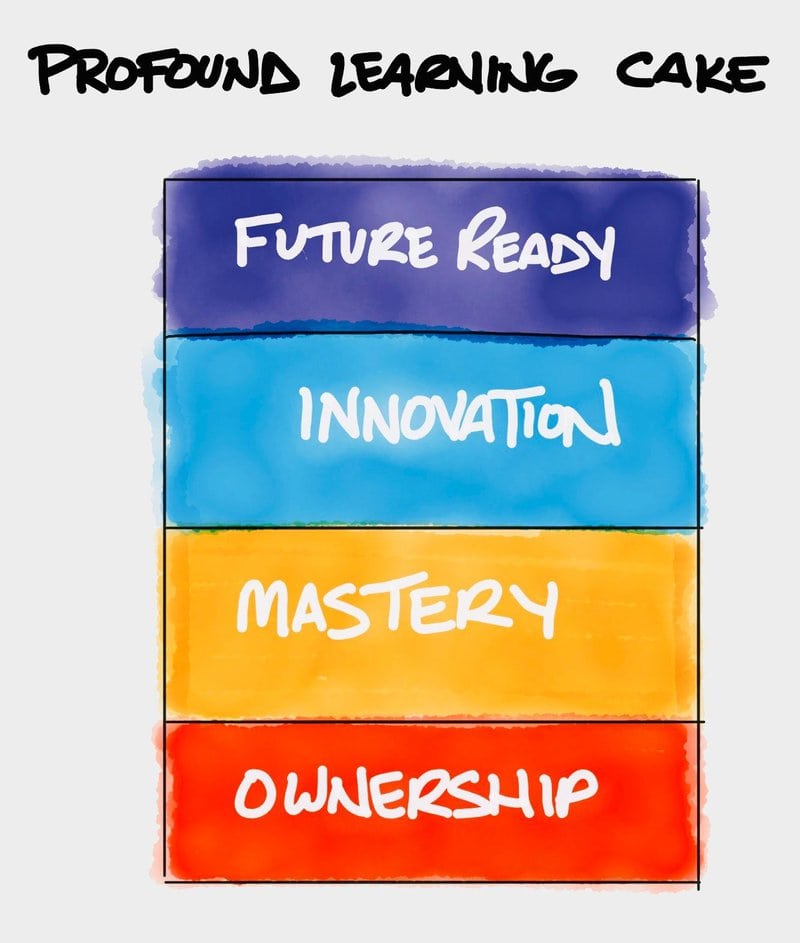
Additionally students are taught the Seven Habits of the Master Learner:
- Person of Character
- Quality Producer
- Lifelong Learner
- Collaborative Worker
- Independent Worker
- Critical and Creative Thinker
- Principle-Centred Leader
If you scroll up again to the World Economic Forum’s 8 major areas of focus for the 4th Industrial Education framework, you’ll see a correspondence between what our students are taught from Kindergarten to grade six.
But we go beyond that in the College…
When students graduate from the Academy, they have the tools and know-how to be life-long learners. As well, the Seven Habits have prepared them for the next two layers of Profound Learning: Innovation and Creativity, and Becoming Imaginal which means cultivating their unique God-given talents and personal vision.
Profound Learning is an Integrated Model of Education
An important point is that while Master’s Academy and Master’s College are separate entities, Master’s pedagogical framework, Profound Learning, is and always has been an integrated system designed to prepare your child for the future. It is a system that begins in kindergarten but culminates in grade twelve.
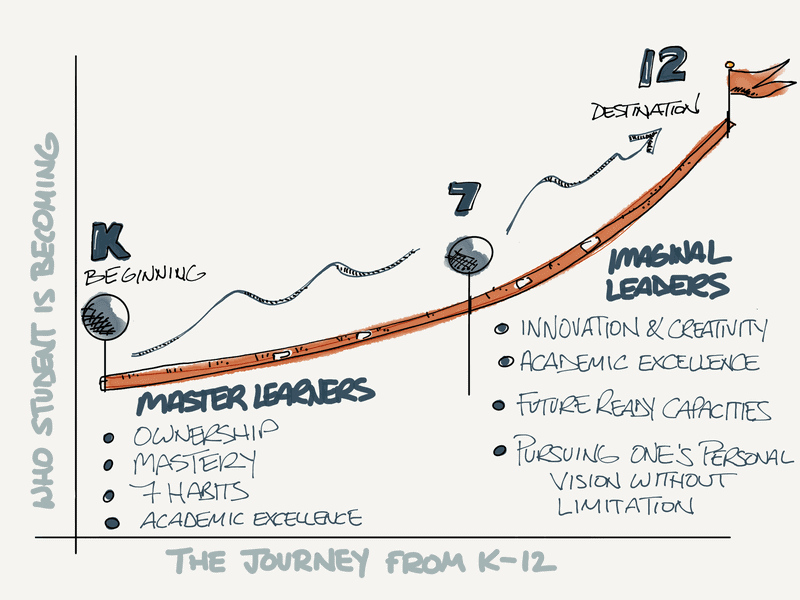
But what goes on in the College? Where does the model develop once your child hits grade seven?
Master’s College Prepares Your Child for the Future of Work
The focus of our College is two-fold:
- Academic excellence
- Becoming an Imaginal Leader through Innovation, Creativity, Collaboration, and Christian Integration
In fact, over the last several years we have been building and running a required course for innovation, creativity, and collaboration called the Imaginal Program.
Did you catch that last sentence?
A required course for innovation and creativity for grades 7-12.
Sounds pretty cool eh. Well let me break it down further for you …
The Imaginal Program has been formally developed over the last several years, but has been conceptually researched and designed for over 20 years. We base the program on a process called Imaginal Thinking: the ability to see, learn from, and create the future.
Now I could get into all kinds of models and explain to you what Imaginal technically means, but I’ll spare you that for now.
All you need to know is that Imaginal Thinking is a fusion of various models and tools for innovation and creativity along with future studies and strategic forecasting.
Moreover, a bulk of these ideas and concepts have come out of our work with international corporate partners in places like Brazil, but that’s for another post on our global partnership program.
Therefore we’re confident that what we’re teaching your child in the College translates directly into the future of work, for we’re using the same models to help other companies and organizations prepare and strategize for their own future sustainability.
Here’s the breakdown of our Imaginal Program.
The Imaginal Program: Seeing, Learning From, Creating the Future
Through our local and international work we have learned a lot about innovation and collaboration within competitive corporate environments and have brought those insights to the framing of our College Imaginal Program.
Here’s just a snippet of the Imaginal Program that is not only happening right now, but continually being innovated and refined.
Building Design Capacity
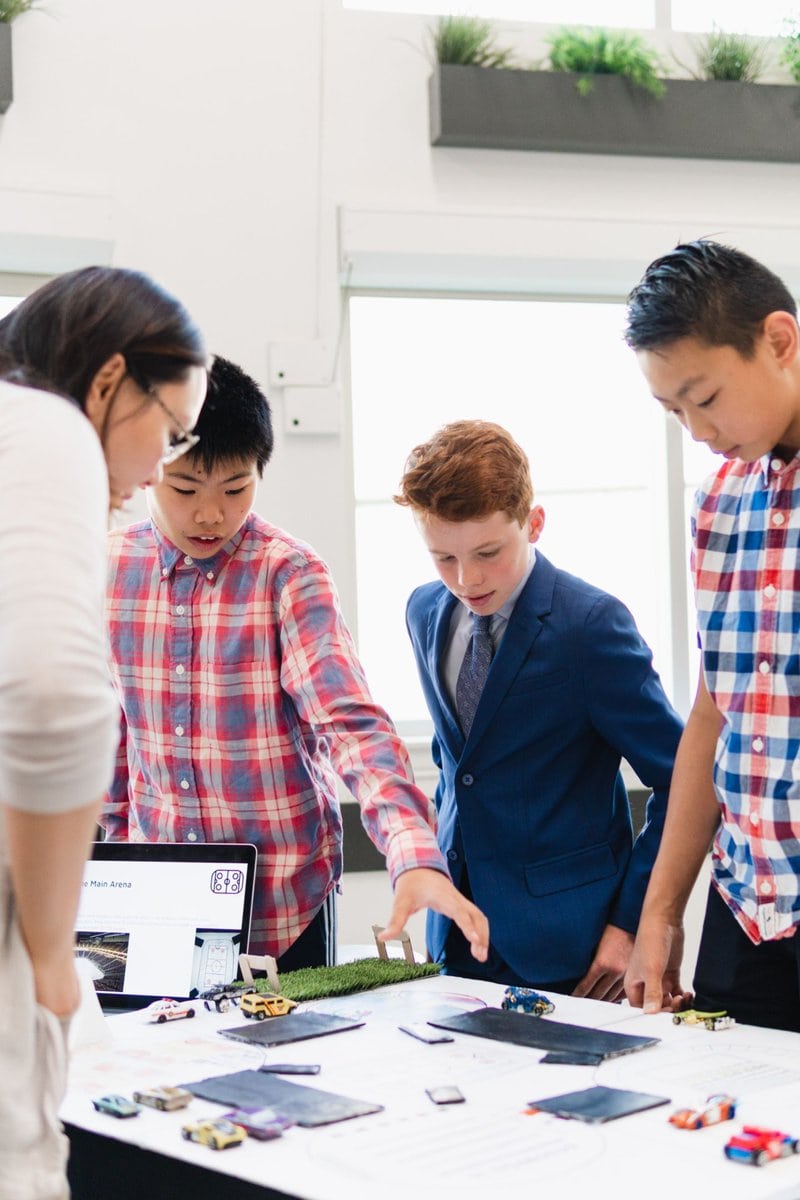
- Grade 7: Focus on design as a process of improvement. It’s a simple process from the Quality movement of looking at an area of need for improvement, creating different solutions, analyzing them, and choosing the best one. The skills here are systems thinking, understanding process, and going through an iterative process to solve a problem.
- Grade 8: A focus on developing skills to see the near-term future and thus opportunities for innovation. Here students are introduced to the process of seeing, learning from, and creating the future. This is a critical skill related to the 4th Industrial Revolution, namely the ability to see the needs of the future before they happen, and creating and innovating new enterprises, NGOs, products and services.
- Grade 9: Building on knowledge from grade 8 for seeing, learning from, and creating the future but this time to see the long-term. The emphasis here is on long-term forecasting and scenario planning, looking at trends with both strong and weak signals. There is a focus on innovation and invention of new enterprises, NGOs, products, and services.
Becoming Imaginal Leaders
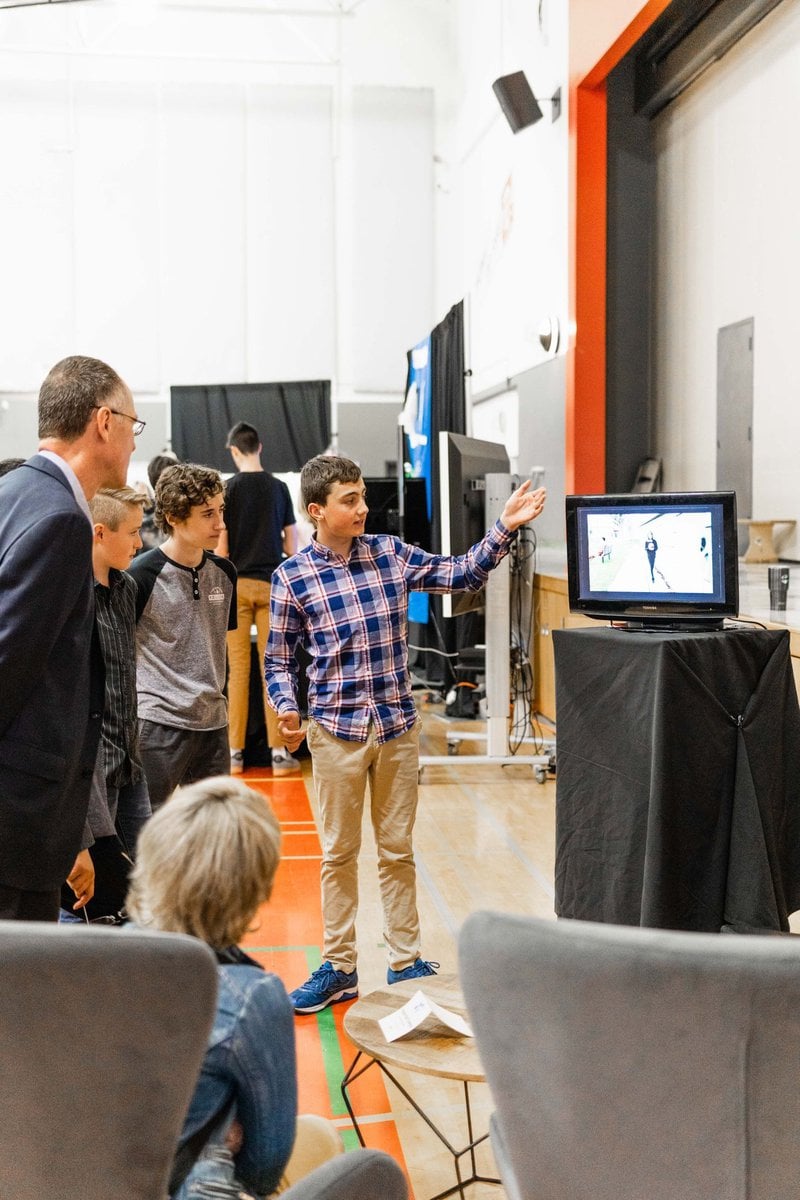
- Grade 10: Focus on Becoming an Imaginal Leader, particularly on understanding the creative environment, the tools, and the creative habits at one’s disposal to pursue personal vision without limitation. A key here is for students to begin the process of finding the BIG WHY of their lives. They study those Imaginal Leaders who have changed history, analyzing what drove them to do what they did, and how those drivers apply to their own lives as students. Another key is understanding the creative process, how it works, and the habits of creative people that can be learned and mastered.
- Grade 11: This is a culminating year in which students take all they have learned from grades 7-10 and apply it to their own ideas and innovations
- Grade 12: The graduating year of Master’s is the time to ask, What difference will you make in the world? What are you going to do with the call God has placed on your life and all the skills and tools you’ve gleaned over the past number of years? Each student creates a project that shows how they are making a difference in the world, doing something bigger than they are.
Now that’s just a glimpse of what we’re doing to prepare our students for the Fourth Industrial Revolution. You can see the threads of creativity, collaboration, and innovation all through those years from 7-12.
But there’s more …
We’re Going BOLD!
While Tom and I were in Brazil back a few years ago, we did a challenge with a company based on Peter Diamandis’s book called ‘BOLD’. The concept worked so well, we thought we’d recreate it for Master’s College students.
The BOLD Challenge is an annual College-wide innovation event in which all of our students set up booths and showcase their ideas for the future. And what skills are they exhibiting there?
You guessed it…
Creativity
Innovation
Collaboration
Leaders in Innovation and Creativity for Over 20 Years
We’ve been working at this innovation and creativity stuff for a long time.
It’s been in our DNA since the doors of Master’s were first opened. It’s something we’ve been working hard on and trying to get better at for over 20 years.
It’s what sets us apart. It’s our vision.
And that’s not all…
Why We’re the Crazy Ones
Through our international work, we continue to share our models with the world, as well as work in industry where innovation, creativity, and collaboration are critical for survival. Our research and development emerges out of playgrounds of bold thinking, audacious ideas, and visionary leadership.
We encourage our students to be ‘the crazy ones’—and in this new Fourth Industrial world that’s rapidly emerging, they’ll have to be…
Faith, Hope, Love, and striving to become all that God has created you to become.
But as Tom Rudmik says time and again in his new parent presentations …
The only reason why we’re able to challenge our students to be crazy, to innovate and create, to have faith, to make a dent in the universe, is because we believe we can too.
We are the crazy ones.
Leave a Comment
Let us know what you think. I’d love to hear your questions and comments. Leave them below and I’ll get back to you as promptly as I can. Your feedback means a lot to us.
